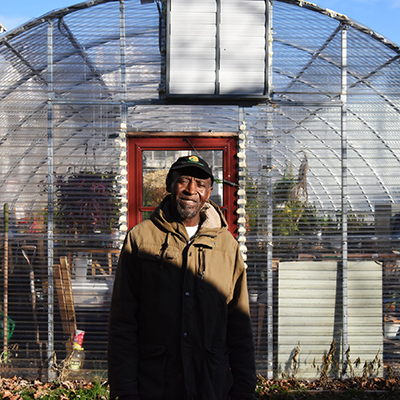Ed Rumley and Joe Malinconico
February 5, 2021
PATERSON — As New Jersey dug out from a massive winter storm, Willie Davis navigated his way around the mounds of snow on Wednesday to get to his community garden on a Paterson street corner.
Davis couldn’t open the gate at first because the snow had packed it shut. After clearing the entrance, he spent more than two hours shoveling the walkways in and around the garden. Finally, Davis was able to open the door of the greenhouse.
“When I went inside, I was just so excited,” said Davis, 70, the son of North Carolina sharecroppers. “It felt so good to see all that green. I felt like I was in heaven.”
In the middle of the most violent section of Paterson’s notorious 4th Ward, Davis, over the past six years, has transformed a vacant into a community garden has become an emblem of hope, a place where struggling families could get fresh produce grown in their own neighborhood.
Three local nonprofit groups — United Way of Passaic County, Paterson Habitat for Humanity and New Jersey Community Development Corporation — helped Davis take the garden to another level in 2019 by starting work on the 700-square-foot greenhouse that was completed last year.
On a sunny day last July, city officials celebrated the new greenhouse with a ribbon-cutting ceremony at the corner of Rosa Parks Boulevard and 12th Avenue. This has been the greenhouse’s first winter, its first chance to provide a horticultural haven amid the cold and snow.
During a visit a few weeks prior to this week’s storm, Davis pointed to a small plot of vegetables including tomatoes, carrots, cabbage and hot peppers that were already growing. He also grows flowers and other plants inside the greenhouse. Davis also is cultivating seeds inside the greenhouse for his spring planting in the outdoor garden because he said buying seeds at a store would be too expensive.
“I sell the flowers and plants to generate income to pay for monthly expenses for the garden but all the food produced is given away,” explained Davis, known as “Deacon.”
When the temperature started to plunge, Davis said it was a challenge to keep the inside of the greenhouse warm enough for vegetation to survive. The thermometer read 48 degrees Fahrenheit in mid-January. Davis has placed stacks of baled hay around the bottom of the inside walls to help battle the cold and absorb moisture.
Andy Stone, a public space consultant who oversaw the development of urban gardens in New York City for nearly 30 years, said that city greenhouses are a rarity but that, nationwide, their numbers are slowly growing.
City Green, a Passaic County nonprofit group, manages a large greenhouse in Clifton, where it store plants from its many outdoor gardens during the winter.
“Greenhouses can be tricky and you have to have knowledge to get them to work,” said Jennifer Papa of City Green.
Papa said City Green’s 1200-square-foot greenhouse in Clifton costs up to $1,200 to heat during the winter.
Stephen Kehayes of Paterson Habitat said his groups considers the Davis’ “Green Acre” garden such a success that it hopes to start another garden elsewhere in the city soon.
Councilwoman Ruby Cotton, who represents the 4th Ward, called Davis “a blessing.”
“Deacon Davis gives out garden food every other Saturday from July to October,” Cotton said. “I have two senior buildings in my ward, Rising Doven and Dr. Norman Cotton, in which the residents depend on him.”
